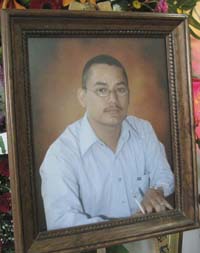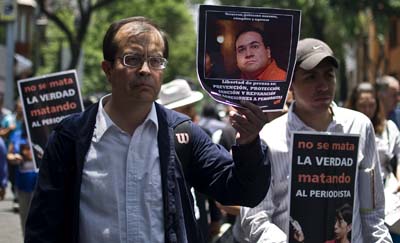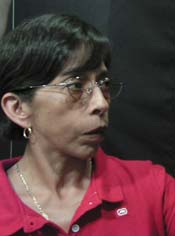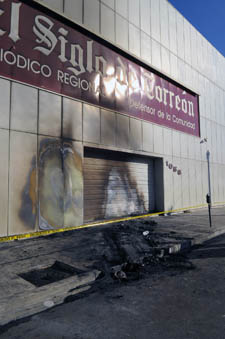
Mexico should investigate murder of abducted journalist
New York, May 21, 2012–Mexican authorities must break the cycle of impunity in journalist murders by fully investigating the killing of police beat reporter Marco Antonio Ávila García and bringing the perpetrators to justice, the Committee to Protect Journalists said today. Ávila’s body, which showed signs of torture, was found on Friday on a dirt…
Crime reporter abducted in Mexico
New York, May 18, 2012–The veteran crime beat reporter Marcos Ávila García was abducted Thursday afternoon in the Mexican town of Ciudad Obregón, in northwest Sonora state, according to news reports. Ávila reports for the local daily El Regional de Sonora, the newspaper said.

Mexican photographers murdered in Veracruz
New York, May 4, 2012–The bodies of two Mexican news photographers who specialized in the crime beat were found along with the bodies of a former photojournalist and a fourth individual in a canal in the city of Boca del Río, in Veracruz state, according to news reports.

Safer mobile use is key issue for journalists
As the Internet and mobile communications become more integrated into reporters’ work, the digital threats to journalists’ work and safety have increased as well. While many press reports have documented Internet surveillance and censorship–and the efforts to combat them–mobile communications are the new frontline for journalist security.

Body of Mexican journalist found beaten, strangled
New York, April 30, 2012–Authorities must immediately investigate the murder of Mexican journalist Regina Martínez Pérez, determine the motive, and ensure the perpetrators are brought to justice, the Committee to Protect Journalists said today. The body of Martínez was found in her home on Saturday evening in Xalapa, the capital of the Gulf Coast state…
Video: Getting Away With Murder
CPJ’s María Salazar-Ferro names the 12 countries where journalists are murdered regularly and governments fail to solve the crimes. Where are leaders failing to uphold the law? Where are conditions getting better? And where is free expression in danger? (4:46) Read CPJ’s 2012 Impunity Index. And visit our Global Campaign Against Impunity and see how…

Amid Mexican impunity, paper in the crossfire
It was 3 o’clock in the morning on Tuesday, November 15, 2011, when a car stopped in front of the offices of El Siglo de Torreón, the most widely read newspaper in the northern Mexican states of Coahuila and Durango. The driver pulled the vehicle onto the shoulder, stepped out, poured gasoline on it, and…
In Mexico, two media outlets attacked within a week
New York, March 27, 2012–Mexican authorities must investigate attacks on a newspaper and TV station in the northeastern state of Tamaulipas and ensure the offices and its staff members are protected, the Committee to Protect Journalists said today. Both attacks occurred within the space of one week.